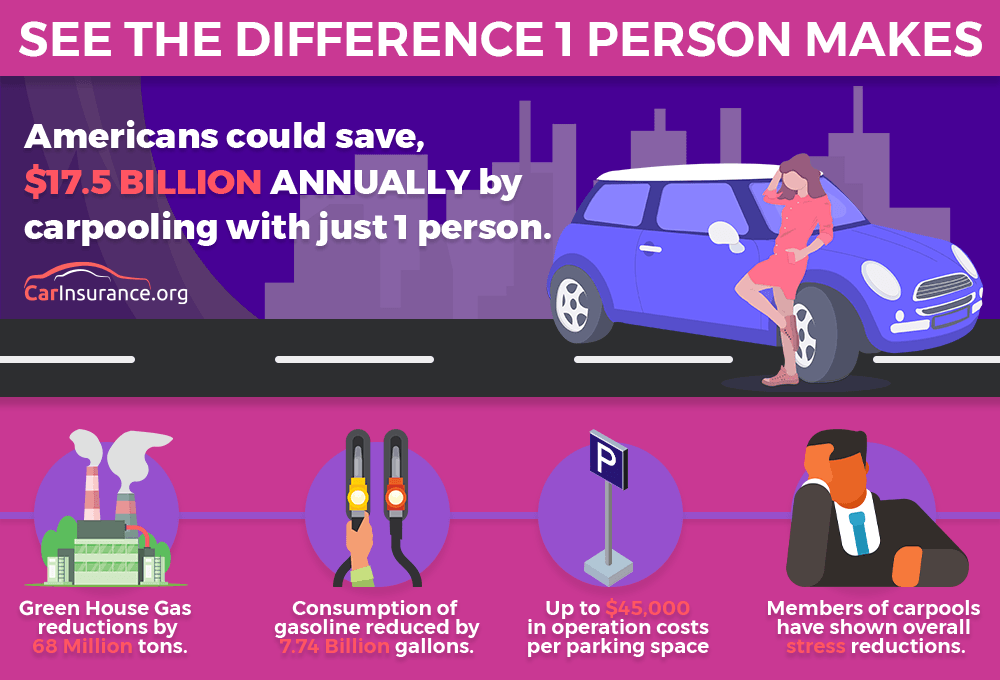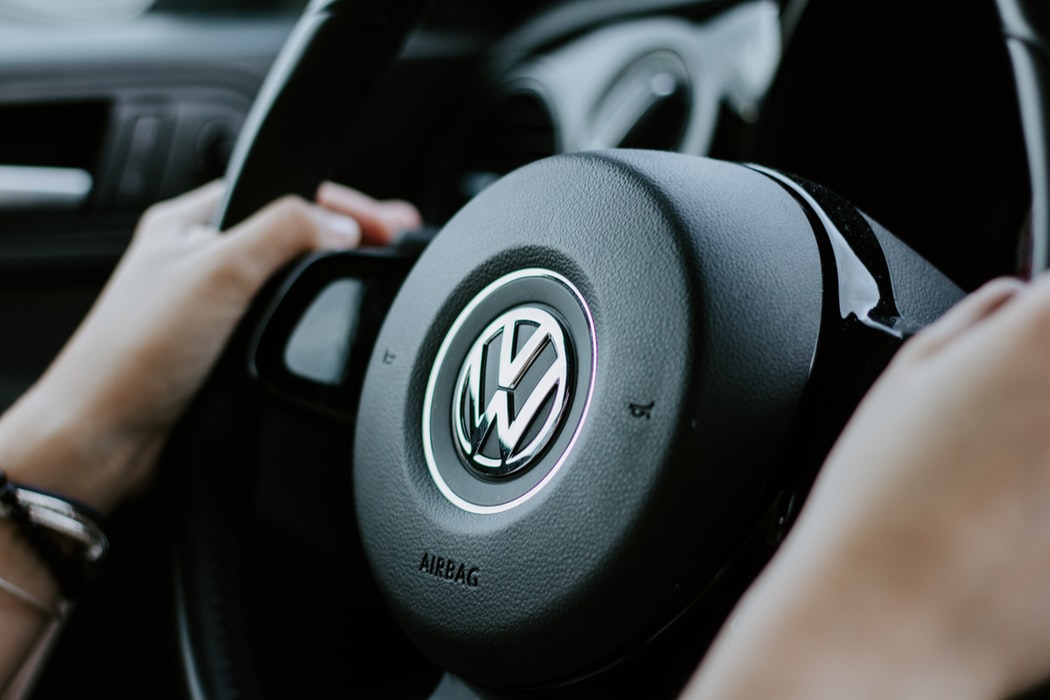Carpooling: Saving Time, Money, and the Planet
It costs an average of 20 cents for every mile you drive, but carpooling can lower these costs. Reducing the cost of driving and lowering pollution levels are just some of the benefits of carpooling.
Read more Secured with SHA-256 Encryption




Table of Contents
Table of Contents


Insurance Feature Writer
Rachel Bodine graduated from college with a BA in English. She has since worked as a Feature Writer in the insurance industry and gained a deep knowledge of state and countrywide insurance laws and rates. Her research and writing focus on helping readers understand their insurance coverage and how to find savings. Her expert advice on insurance has been featured on sites like PhotoEnforced, All...
Rachel Bodine


Licensed Insurance Agent
Eric Stauffer is an insurance agent and banker-turned-consumer advocate. His priority is educating individuals and families about the different types of insurance coverage. He is passionate about helping consumers find the best coverage for their budgets and personal needs. Eric is the CEO of C Street Media, a full-service marketing firm and the co-founder of ProperCents.com, a financial educat...
Eric Stauffer
Updated March 2025
What is carpooling? Commuters who drive to work together in one vehicle are considered to be carpooling. They could be workers, neighbors, or family members. Some rideshare apps even connect strangers to carpool together to nearby areas.
Why carpool? Because carpooling can save you money on gasoline, reduce your car insurance costs, and help save the environment by reducing greenhouse gas emissions. It also reduces traffic congestion and saves you time. With fewer cars on the road, everyone can get where they’re going faster, and you don’t necessarily have to rely on public transport.
Check out our infographic below for more carpooling statistics and how the benefits of carpooling can save you time and money and reduce your stress.
Enter your ZIP code above to compare car insurance quotes to see how much carpooling can save you.
The Impact of Carpooling on Personal and Public Health
Carpooling is not only an effective way to save on costs and reduce environmental impact, but it also has significant benefits for both personal and public health. This section explores how carpooling contributes to healthier lifestyles and communities.
Free Insurance Comparison
Compare Quotes From Top Companies and Save
Secured with SHA-256 Encryption
The Meaning of Carpooling and Its Health Benefits
Carpooling benefits for the environment are substantial, as it reduces the number of vehicles on the road, leading to lower emissions and improved air quality. Carpooling’s potential to save the environment is significant, making it a popular choice among those looking to lessen their ecological footprint.
While carpooling slogans often highlight its positive impact and convenience, it’s important to understand the difference between carpooling and ridesharing. Carpooling typically involves sharing a ride with known individuals, whereas ridesharing can include connecting with strangers through apps.
Personally, I saved a lot of money on car insurance by reducing my driving mileage through carpooling, demonstrating its financial benefits in addition to its environmental and health advantages.
Carpooling Definition and Its Health Implications
Carpooling involves sharing a ride with one or more people, which reduces the number of vehicles on the road. The meaning of carpooling extends beyond just transportation—it influences health in several ways. By reducing the number of cars on the road, carpooling decreases the emission of pollutants and particulate matter, leading to cleaner air and potentially fewer respiratory problems.
Advantages of Carpooling for Personal Health
The importance of carpooling extends beyond financial savings and environmental benefits; it also has significant effects on personal health. The positive impact of carpooling includes reduced stress levels and improved mental well-being, as sharing driving responsibilities can alleviate the anxiety of daily commutes.
While exploring the pros and cons of carpooling, it’s clear that the advantages such as lower stress and improved cardiovascular health outweigh the potential drawbacks.
Similarly, the pros and cons of vanpooling reveal that, although vanpooling may offer fewer personal space benefits compared to carpooling, it still contributes to a healthier lifestyle by further reducing the number of vehicles on the road and promoting physical activity.
Reducing Stress and Improving Mental Well-Being
The benefits of carpooling for commuting to work include reduced stress levels. Navigating busy traffic can be a major source of anxiety, but carpooling allows for more relaxed travel. Sharing driving responsibilities means less time spent behind the wheel, which can improve mental well-being. Carpooling can also foster social connections, which are beneficial for emotional health.
Healthier Lifestyles Through Reduced Car Use
With fewer cars on the road, individuals are likely to experience improved cardiovascular health. Less frequent driving means more opportunities for physical activity, whether it’s walking to a carpool pickup point or using a bike for short distances.
Benefits of Carpooling for the Environment and Public Health
There are several compelling reasons to carpool, including its positive impact on both the environment and public health. State the advantages of carpooling by highlighting how it reduces the number of vehicles on the road, which in turn decreases greenhouse gas emissions and improves air quality.
Additionally, the success of carpooling incentives in various regions demonstrates how effective these programs can be in encouraging more people to adopt this practice. Using a carpool saves on fuel costs, minimizes vehicle wear and tear, and contributes to a healthier lifestyle by reducing traffic congestion and pollution.
Advantages of Carpooling for the Environment
The advantages of carpooling for the environment are well-documented. By lowering the number of vehicles on the road, carpooling reduces greenhouse gas emissions and air pollution. These environmental benefits translate into better air quality, which contributes to overall public health.
Public Health Benefits and Emission Tracking
Using an app to track how much emission you save by carpooling can provide valuable insights into the environmental impact of your efforts. These apps can help carpoolers understand their contribution to reducing pollution and can motivate more people to participate in carpooling.
Free Insurance Comparison
Compare Quotes From Top Companies and Save
Secured with SHA-256 Encryption
Carpooling Options and Insurance
Carpool Insurance and Carpool Quotes
When considering carpooling, it’s essential to understand carpool insurance options. Carpool insurance ensures that all participants are covered in the event of an accident. Carpool quotes and rates vary depending on the insurance provider and the specifics of your carpool arrangement.
Finding Carpooling Options Near Me
To start carpooling, look into local carpooling options near me. Many communities have carpool programs or apps that connect commuters. Exploring these options can help you find the best carpool arrangement for your needs and further maximize the benefits of carpooling.
In summary, carpooling offers numerous health benefits in addition to its well-known advantages for cost savings and environmental impact. Understanding the meaning of carpooling and its positive effects on personal and public health can encourage more people to participate.
By leveraging carpooling options, tracking emissions, and securing appropriate carpool insurance, individuals can contribute to a healthier lifestyle and a cleaner environment.
Facts About Carpooling
Carpooling offers numerous benefits that can significantly impact both personal finances and the environment. Here are some key points:
- The Advantage of Carpooling: Carpooling reduces the number of vehicles on the road, leading to lower fuel consumption, reduced wear and tear on vehicles, and decreased traffic congestion. It also helps in lowering greenhouse gas emissions and improving air quality.
- Article About Carpooling: Carpooling is extensively covered in various articles highlighting its benefits, such as cost savings, environmental impact, and health advantages. These articles often provide detailed insights into how carpooling can be an effective strategy for reducing daily commuting costs and enhancing overall well-being.
- Car Insurance Savings from Carpooling: By carpooling, individuals can lower their car insurance premiums. This is because fewer miles driven can qualify drivers for low-mileage discounts and reduced coverage options. As a result, drivers can save on both insurance and fuel costs.
- Carpool Prices: The cost associated with carpooling is generally lower than driving alone. Sharing rides with others means that expenses such as fuel and maintenance are distributed among participants, reducing the overall cost per person.
- Carpool Rates: Carpool rates refer to the pricing structures or agreements that may be set when organizing a carpool. This can include the cost of sharing fuel, or other expenses, which is often lower than the cost of individual car usage.
- Meaning of “Carpooled”: The term “carpooled” refers to the act of sharing a car journey with one or more people to a common destination. This practice is intended to reduce the number of vehicles on the road and lower individual transportation costs.
- Meaning of “Carpoolers”: “Carpoolers” are individuals who participate in carpooling. They share a vehicle for their commute or trips, contributing to reduced traffic congestion and lower transportation costs while also fostering social connections.
What are the benefits of carpooling to work?
While 80 percent of people drive themselves to work every day, only 9.4 percent of them carpool despite the numerous financial and environmental benefits of carpooling.
Carpooling benefits the environment and our communities. Even if everybody carpooled with just one other person, we’d eliminate countless pounds of carbon dioxide every day while reducing air pollution in general. The higher number of cars on the road continues to have a serious environmental impact. The advantages of carpooling apply to your wallet as well.
If you carpool to work, you can lower your car insurance rates by qualifying for low-mileage discounts and reduced coverage. Imagine paying auto insurance on driving 3 days a week instead of 5. If you’re looking at everyday fuel costs, you can cut your gallons of fuel consumption into a fraction of what it was. This leaves more money and gas for fun activities and spreads out your maintenance on personal vehicles. We pay for cars that have greater fuel efficiency, but you’d save more by going from 100 miles a week to 50 by carpooling.
Even if your car doesn’t use fossil fuels, you can still reduce your maintenance costs on the average vehicle. Your tires won’t wear down as fast, and your brakes will be good longer. Even fully electric vehicle drivers can save a lot of money doing this. (For more information, read our “Car Maintenance Expenses“).
Read more: Alternative Fuel Vehicles
Free Insurance Comparison
Compare Quotes From Top Companies and Save
Secured with SHA-256 Encryption
Why is carpooling good for my budget?
The U.S. Census Bureau’s 2011 American Community Survey shows that only around 9.7 percent of American employees chose carpooling to work that year, despite the numerous environmental and financial benefits of carpooling.
According to AAA’s Your Driving Costs 2012, between gas, maintenance, and wear on tires, it costs an average of 20 cents for every mile you drive, which can add up quickly and vary depending on driving conditions.
When driving your vehicle, carpooling allows you to share this cost of the rides with your friend or passengers, or you may be able to alternate the vehicles being driven between your fellow carpoolers, which evenly distributes costs and vehicle wear and tear. It allows you to reduce wear and share costs with other passengers. You’ll save money on gas and maintenance by reducing the number of miles you drive per day.
Carpooling can also save you time and reduce your stress, especially if you live in a busy city. Most major cities encourage carpooling by offering high occupancy vehicle (HOV) lanes, allowing you to cruise by stop-and-go highway traffic based on the number of passengers in your car. If everybody did this, it could mean thousands of vehicles off the road each day and less time on the road for everyone. It could also mean fewer accidents and less time on the road. Your daily commute doesn’t have to be so stressful.
Also, most major cities have carpooling or high occupancy vehicle HOV lanes, allowing you to cruise in the carpool lanes while passing the stop-and-go traffic in the main lanes, which saves you time and increases your gas mileage, saving you on the cost of gas money.
Take a look at our infographic below for more carpooling statistics.
How does carpooling reduce carbon emissions?
Carpooling reduces carbon emissions by minimizing the total number of cars on the road, which lowers overall fuel consumption. With fewer vehicles burning fuel, the amount of carbon emissions released into the atmosphere decreases, leading to a positive environmental impact.
Carpool Statistics Infographic
Our infographic on carpooling statistics below takes a look at the state of carpooling and ridesharing in the U.S:
Where can I find a carpool near me?
If you commute thirty minutes or more, talk to your co-workers or neighbors about carpooling together. Living near someone you work with, or if a co-worker lives on your way to work, is the easiest way to find carpooling near you.
Some commuters also use ridesharing or carpool apps like Waze Carpool that will connect you with drivers and passengers nearby headed in the same direction. You can also put in ride requests or look into public transportation.
Some carpool and ridesharing apps let you choose whether you want to be the driver or the passenger while others don’t. Generally, these apps come with a fee. So test out a few to see which works best with your schedule.
If you don’t own a car and are curious about carpooling quotes and car insurance, read our guides on rideshare insurance and non-owner car insurance coverage to learn more.
Frequently Asked Questions
Why carpool?
Carpooling offers several benefits including cost savings on fuel and maintenance, reduced vehicle wear and tear, decreased car insurance rates, and a positive environmental impact. It also helps alleviate traffic congestion and lowers stress associated with daily commutes.
Why is carpooling good for the environment?
Carpooling is good for the environment because it reduces the number of vehicles on the road, which leads to lower greenhouse gas emissions and improved air quality. By decreasing the number of cars, carpooling helps cut down on pollution and contributes to a cleaner, healthier environment.
Why is carpooling beneficial?
Carpooling is beneficial because it helps save money on fuel and maintenance, reduces traffic congestion, lowers stress levels, and lessens the environmental impact of driving. It also fosters social connections among carpoolers and can lead to more efficient use of resources.
Why should I carpool?
You should consider carpooling to save money on fuel and car maintenance, reduce your car insurance costs, help the environment by decreasing emissions, and alleviate the stress of daily commuting. Additionally, carpooling can contribute to a sense of community and improve your overall well-being.
How can carpooling help the environment?
Carpooling helps the environment by reducing the number of cars on the road, which lowers the amount of greenhouse gases and other pollutants released into the atmosphere. This leads to improved air quality and lessens the overall ecological footprint of transportation.
How can good driving save money?
Good driving practices can save money by reducing fuel consumption, minimizing wear and tear on your vehicle, and lowering maintenance costs. Efficient driving, such as avoiding rapid acceleration and hard braking, can improve your car’s fuel efficiency and extend its lifespan.
How does carpooling work?
Carpooling works by sharing a ride with one or more individuals who have similar destinations. Commuters can arrange carpooling through informal agreements with friends or colleagues, or through formal carpool programs and rideshare apps that match drivers with passengers heading in the same direction.
How much does carpooling cost?
The cost of carpooling varies depending on factors such as the number of people in the carpool, the distance traveled, and the arrangement between carpoolers. Typically, costs are shared among participants, which can significantly lower individual expenses for fuel and maintenance.
How much should I pay for carpooling?
The amount you should pay for carpooling depends on the agreement with your fellow carpoolers. Generally, costs are shared based on distance traveled and fuel expenses. It’s best to discuss and agree on a fair contribution amount with your carpool partners.
How to save money quickly for a car?
To save money quickly for a car, consider creating a budget, cutting unnecessary expenses, increasing your income through side jobs, and setting up a dedicated savings account. Additionally, you can explore financing options or use any savings from carpooling to accelerate your savings goal.
How does carpooling save money?
Why is carpooling important?
How does carpooling help reduce air pollution?
How does carpooling help reduce carbon dioxide?
How does carpooling reduce traffic?
Is carpooling safe?
Is carpooling illegal?
Get a FREE Quote in Minutes
Insurance rates change constantly — we help you stay ahead by making it easy to compare top options and save.




